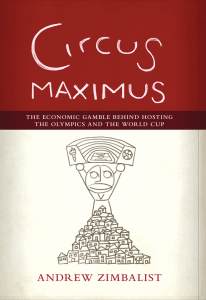
Boston Wrong
Author, Economist Andrew Zimbalist Says Olympics Are a Bad Deal
 Andrew Zimbalist shakes his head at the prospect of the Summer Olympics coming to Boston in 2024. While the U.S. Olympic Committee paints a rosy picture of gleaming new construction, increased tourism, and long-term economic growth, Zimbalist argues that Olympic host cities almost never see these benefits.
Andrew Zimbalist shakes his head at the prospect of the Summer Olympics coming to Boston in 2024. While the U.S. Olympic Committee paints a rosy picture of gleaming new construction, increased tourism, and long-term economic growth, Zimbalist argues that Olympic host cities almost never see these benefits.
As one of the world’s foremost sports economists, he should know. In fact, the Smith College professor of Economics recently published a book, Circus Maximus, on this very topic.
“In theory, the Olympics aren’t bad,” Zimbalist told BusinessWest. “In practice, there’s virtually no evidence that the city benefits. There may be some short-term benefit if everything goes well, in terms of volunteerism, pride, and togetherness. People feel good for a couple of months, then that fades away.”
“But,” he continued, “is it worth $5, $10, $15 billion to have that experience? The city ends up getting saddled with debt, and many times saddled with stadiums that are underutilized. Because of the cost to build and maintain them, we call them white elephants. And the presumed benefits of increased tourism, increased trade, and increased foreign investment are now borne out empirically; these things don’t increase over the trajectory they were already on.”
In short, if your city is chosen to host the Olympics, it probably didn’t need an image boost to begin with. And it certainly doesn’t need the debt. For a return of some $5 billion or $6 billion, the cost of staging the Summer Olympics were an estimated $16 billion in Athens in 2004, $40 billion in Beijing in 2008, and nearly $20 billion in London in 2012 — much of this investment tied up in infrastructure projects that may not be useful going forward.
Zimbalist argues that the Olympics are sold to the public as an economic boon when it’s just the opposite, a catalyst for tourism when evidence suggests it’s not.
“Whether it’s congestion, terrorism, or other fears, not one of these things necessarily makes people want to come to your city and trade with your city,” he said. “Even when the Olympics are pulled off well, are there really people around the world who haven’t heard of Boston and say, ‘hey, let’s travel to Boston’? Probably a few. It’s fair to say there are some feel-good benefits, but they’re very evanescent, very ephemeral. And for the economy, the benefits are illusory.”
Frankly, he continued, the Olympics are an opportunity for special interests to line their pockets at the long-term expense of the host city and the public. In a broad, candid interview with BusinessWest, he explained several reasons why the bidding and organizing structure encourages that outcome, and why the system isn’t likely to change anytime soon.
The Price Isn’t Right
If the bidding process were rational, Zimbalist argues, local organizing committees would understand how much their city stands to gain, and then cap their bids below that level.
The problem is that local committees are dominated by private business interests — contractors, construction unions, architects, investment bankers, and lawyers, to name a few — which individually stand to gain from the massive construction required by the International Olympic Committee (IOC).
“Boston 2024 is a committee of private executives, largely from the construction industry. Some other industries are represented as well, but construction benefits more than any other industry,” he explained, adding that the construction contracts to be handed out are essentially “other people’s money.”
“Some of it comes from the Olympic Games, some from taxpayers, some from corporate sponsors, but it’s not their money. And they’re going to get the contracts; why wouldn’t they love the Olympics? They get to do all this massive construction in a relatively short period of time. Meanwhile, a lot of contracts get rushed and get charged higher costs than normal.”
The model suffers from what economists call a “principal/agent problem,” Zimbalist explained. The city (the principal) is not properly represented by the local organizing committee (the agent). So the more extravagant the bid, the more the committee members personally benefit, and they don’t think about (or care about) the public benefit versus the public cost — hence, the massive overbidding.

In his latest book, Andrew Zimbalist makes the case that the Olympics saddles host cities with debt while bringing few long-term benefits.
“That situation almost always ends up with an overzealous overcommitment for extra funding, extravagance, and frills. Imagine six or seven cities all wanting to get this; five cities think it’s worth $4 billion, but one city thinks it’s worth $5 billion. That city is the outlier, the one that can’t agree with everyone else, and they’re the ones that end up winning.”
Will Boston approach its bid differently? Not if it wants to win, Zimbalist said.
“We keep hearing about how frugal and bare-bones Boston is going to be. They’re going to be building, they say, an Olympic stadium with a 60,000-seat capacity that doesn’t have any luxury boxes, club seats, or catering facilities, among other things. And when the games are over, they’ll take it apart.
“Other than the fact that, in my mind, it makes no sense to spend $500 million on a stadium that exists for 17 days,” he continued, “the problem is, Boston’s going to be competing against cities like Paris, Rome, either Berlin or Hamburg, Melbourne, Doha (capital of Qatar), and Johannesburg, and they’re not all going to put forward bare-bones plans. At the end of the day, the IOC will take the plan that most honors them and their traditions, and that’s going to be the most extravagant plan.”
In short, he said, “meeting the committee’s demands for infrastructure and facilities makes it impossible economically to get a reasonable return. That’s the most difficult thing Boston or any other city has to overcome.”
Tourist Trap
But what about the long-term gains a city might realize in increased tourism? It’s an attractive idea, Zimbalist said, but the publicity generated by the Games themselves is not guaranteed to be positive. Just ask the organizers of Olympics plagued by disorganization (London, Sochi), pollution (Beijing), corruption (Salt Lake City, Nagano), or terrorism (Atlanta).
“The publicity you get is not necessarily good publicity,” he went on. “Mexico didn’t get good publicity when they had to kill 2,000 students demonstrating, or when the African-American athletes raised their fists on the medal stands to protest race relations in the States. Munich didn’t get good publicity when 11 Israeli athletes were killed by terrorists. Montreal didn’t get good publicity when budget overruns were nine times over the initial bid price.”
Even during the Games, evidence suggests that the influx of Olympic tourism is offset by locals moving away for three weeks and tourists who would otherwise visit the city staying away as well. “In the short run, a lot of tourists decide they don’t want to deal with the high prices, congestion, and security issues, and tourism goes down in net terms.”
The best way to promote tourism is word of mouth, and that doesn’t translate to the Olympics, he added.
“Normally, when a tourist goes to Boston, he goes home and talks to friends and relatives: ‘Boston was great! We went to the Boston Garden, we saw the U.S.S. Constitution, we visited the Museum of Fine Arts, we heard the symphony’ … on and on. And people say to themselves, ‘hey, I want to go to Boston, too.’ But an Olympic tourist goes home and says, ‘I saw a terrific 50-meter dash, really exciting hurdles, a great relay.’ That’s not going to promote tourism in Boston. You lose the word-of-mouth effect.”
Zimbalist admits there have been exceptions. Barcelona, which staged the Summer Games in 1992, is often held up as a model for the Olympics bringing long-term benefits to the host city.
However, “Barcelona was a complicated story with many elements to it,” he explained. “Barcelona and Catalonia had been neglected regions for many years. When Franco died in 1975, the people of Barcelona said, ‘we’ve got to rebuild our city.’” That effort involved razing a warehouse district that separated downtown from the sea and a series of other development initiatives, all underway long before the Olympic bid.
“When they won the games, they had been building anyway. They started with a vision and an actual plan to change their city, and they folded the Olympics into that,” Zimbalist said. “They reversed the usual order, where there is no coherent plan, and the IOC tells you it needs 33 venues, and you contort your city to fit their plan.
“Barcelona was a gem of a city, largely undiscovered, with spectacular architecture, interesting culture, good climate, and a great location,” he said. “It was a city waiting to happen, and the Olympics gave it the spark.”
The Case for Reform
Boston, Zimbalist argues, does not need that spark, and neither do most countries bidding for the Games. In fact, the money they will spend over decades for that 17-day extravaganza would be better invested in needed infrastructure improvements, reduced rates from the national airline to boost tourism, multiplied trade missions, and a host of other efforts with tangible, long-term benefits.
Barcelona ran up a $6 billion debt to host the 1992 Summer Games, but the resulting image boost and surge in tourism continues to this day. Still, he said, the city is an outlier among all the other recent hosts still saddled with debt and rusting hulks of unused metal that once housed two weeks of sporting events.
Critics have floated ideas to reform the bid system — for example, choose a handful of rotating sites around the globe with permanent venues, which would dramatically reduce infrastructure costs.
“You could do a continental rotation system,” Zimbalist explained. “Every four years, a different continent would be the host, and the continent could choose one venue. It would ensure you wouldn’t have to rebuild the Olympic stadium. I think that makes a lot of sense. But the cities not chosen would say that’s not fair.”
Meanwhile, the IOC is starting to feel the heat for its debt-generating ways in the form of caution from potential host cities, particularly in the lower-profile Winter Games. Cities such as Oslo, Stockholm, Munich, and Davos all bailed out of 2022 bids, leaving only Beijing and Almaty, Kazakhstan currently in the running.
“Both are autocratic countries, and neither is ideal for hosting,” he said. “The extravagance, the gigantism, the grandiosity has gone so far that cities have started becoming leery about bidding.”
Will the International Olympic Committee change its ways? Zimbalist doesn’t think so.
“The IOC is reportedly making the case for other cities to bid,” he said. “They’re trying to gin up interest in the Olympics again so they can resume their traditional competitive bidding and extravagance.”
In other words, business as usual. Boston has been warned.
Joseph Bednar can be reached at [email protected]





